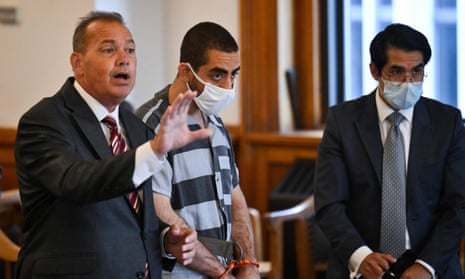The man accused of stabbing novelist Salman Rushdie last week in western New York pleaded not guilty to second-degree attempted murder and assault charges on Thursday.
Hadi Matar, 24, is accused of wounding Rushdie, 75, on Friday just before the author of The Satanic Verses was to deliver a lecture on stage at an educational retreat near Lake Erie. Rushdie was hospitalized with serious injuries in what writers and politicians around the world decried as an attack on the freedom of expression.
Matar was arraigned during a brief hearing in Chautauqua county district court on an indictment returned earlier in the day by a grand jury that charged him with one count of second-degree attempted murder and one count of second-degree assault.
“His mission to kill Mr Rushdie is greater in his mind and outweighs his personal freedom” said district attorney Jason Schmidt, who argued that Matar should be kept in custody.
County court judge David Foley ordered Matar to remain in custody without bail. He issued a protection order that prohibits Matar from going near Rushdie and Ralph Henry Reese, the moderator of the lecture, who suffered minor injuries.
“In these situations where emotions run high, feelings run high, it’s important that the criminal justice system is still at its best,” Matar’s lawyer Nathaniel Barone II said on Tuesday. “This is the opportunity for Mr Matar to receive every benefit from our constitution – a presumption of innocence, due process, a fair trial.”
The attack came 33 years after Ayatollah Ruhollah Khomeini, then Iran’s supreme leader, issued a fatwa, or religious edict, calling on Muslims to assassinate Rushdie a few months after The Satanic Verses was published.
Some Muslims saw passages about the Prophet Muhammad as blasphemous.
Rushdie, who was born in India to a Muslim Kashmiri family, has lived with a bounty on his head ever since. He spent nine years in hiding under British police protection.
In 1998, Iran’s pro-reform government of President Mohammad Khatami distanced itself from the fatwa, saying the threat against Rushdie was over. But the multimillion-dollar bounty has since grown and the fatwa was never lifted: Khomeini’s successor as supreme leader, Ayatollah Ali Khamenei, was suspended from Twitter in 2019 for saying the fatwa against Rushdie was “irrevocable”.
In an interview published by the New York Post on Wednesday, Matar said he respected Khomeini but would not say if he was inspired by the fatwa. He said he had “read a couple of pages” of The Satanic Verses and watched YouTube videos of the author.
“I don’t like him very much,” Matar said of Rushdie, as reported in the Post. “He’s someone who attacked Islam, he attacked their beliefs, the belief systems.”
Iran’s foreign ministry on Monday said that Tehran should not be accused of being involved in the attack. “In this attack, we do not consider anyone other than Salman Rushdie and his supporters worthy of blame and even condemnation,” an Iranian foreign ministry spokesperson, Nasser Kanaani, said. Matar is believed to have acted alone, according to police.
Matar is a Shia Muslim who was born in California to a family from Lebanon.
Prosecutors say he travelled to Chautauqua Institution, a retreat about 12 miles (19km) from Lake Erie, where he bought a pass to Rushdie’s lecture. He told the New York Post that he took a bus to Buffalo the day before the attack and then hailed a ride-share car to Chautauqua.
“I was just outside the whole time,” Matar told the New York Post, adding that he slept outside on the grass the night before the attack.
Witnesses said there were no obvious security checks at the lecture venue and that Matar did not speak as he attacked the author. He was arrested at the scene by a New York state police trooper after being wrestled to the ground by audience members.
Rushdie sustained severe injuries in the attack, including nerve damage in his arm, wounds to his liver, and the likely loss of an eye, his agent said.
